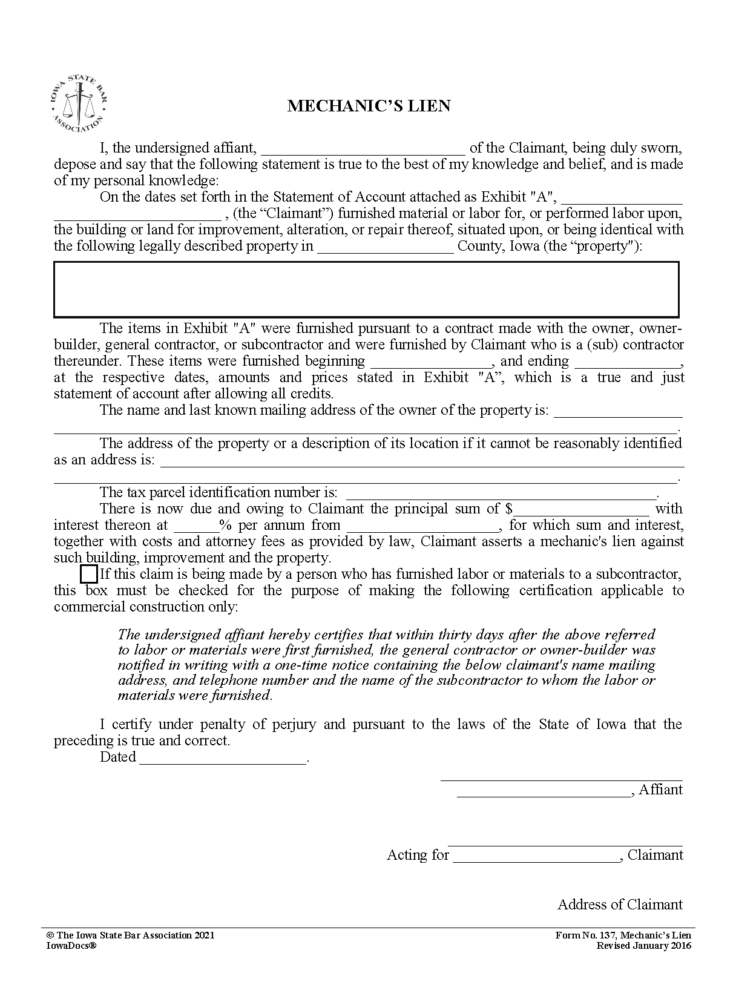Key Elements of Iowa Mechanics Lien Law
Iowa mechanics lien law provides a legal way for contractors, subcontractors, and suppliers to secure payment for work or materials provided on a construction project. When someone fails to pay for these services, a mechanics lien can be filed against the property, creating a claim for the owed amount. This process ensures that those who contribute to the improvement of a property can receive compensation, protecting their rights in the construction industry.
Understanding the Purpose of Mechanics Liens

The main purpose of mechanics liens is to protect the rights of those who contribute labor or materials to a construction project. Here are some key points:
- Financial Security: Mechanics liens help ensure that contractors and suppliers are paid for their work, giving them a level of financial security.
- Encouragement of Timely Payments: Knowing that a lien can be filed may encourage property owners to make payments on time.
- Priority in Payment: A filed lien gives the claimant priority over other creditors when the property is sold or refinanced.
- Legal Recourse: Mechanics liens provide a clear legal path for seeking payment, which can be more efficient than pursuing a lawsuit.
By using mechanics liens, workers and suppliers can protect their hard work and investment in a project, ensuring they have a means to collect payment.
Who Can File a Mechanics Lien in Iowa
In Iowa, various parties involved in the construction process can file a mechanics lien. Understanding who qualifies is essential for protecting their rights. Here’s a breakdown:
- Contractors: General contractors who have a direct contract with the property owner are eligible to file a lien.
- Subcontractors: Those who work under a general contractor and have contributed labor or materials can also file a lien.
- Suppliers: Material suppliers that provide goods for the project can claim a lien for unpaid materials.
- Laborers: Individuals who provide labor on the site may also be able to file a lien, provided they meet certain criteria.
It’s important for each party to understand their rights and the specific conditions under which they can file a mechanics lien in Iowa. This knowledge helps ensure that all contributors to a construction project can protect their financial interests.
Steps to File a Mechanics Lien in Iowa
Filing a mechanics lien in Iowa is a straightforward process, but it does require attention to detail. Here are the steps you need to follow to ensure your lien is valid:
- Gather Necessary Information: Before you start, collect all relevant details, including the property owner’s name, the property description, and the amount owed.
- Draft the Mechanics Lien: Prepare the lien document. This must include specific information such as:
- Your name and address
- The property owner’s name
- A description of the property
- The amount owed
- A brief description of the work done or materials provided
- File the Lien: Once the lien is drafted, file it with the appropriate county recorder’s office where the property is located. This typically involves paying a filing fee.
- Provide Notice: After filing, you must send a copy of the lien to the property owner and any other parties involved. This helps ensure everyone is aware of the claim.
- Follow Up: Keep track of your lien status and be prepared to enforce it if necessary.
By following these steps carefully, you can effectively file a mechanics lien and protect your right to payment.
Requirements for a Valid Mechanics Lien
To ensure that your mechanics lien is valid in Iowa, certain requirements must be met. If these conditions aren’t satisfied, your lien could be challenged or dismissed. Here’s what you need to know:
- Proper Documentation: The lien must be in writing and include essential details like the property owner’s name, property description, and the amount due.
- Timeliness: You must file the lien within specific timeframes:
- For general contractors, within 90 days after the last day of work.
- For subcontractors and suppliers, within 90 days after the last day of work or delivery of materials.
- Verification: The lien must be signed and verified by the person filing it, affirming that the information is true.
- Proper Filing: The lien must be filed in the correct county where the property is located.
By ensuring that you meet these requirements, you can increase the chances of your mechanics lien being upheld if contested.
Enforcing a Mechanics Lien in Iowa
Once a mechanics lien is filed, it’s important to understand how to enforce it if payment is not made. Here’s a breakdown of the enforcement process:
- Understand the Enforcement Deadline: In Iowa, you typically have two years from the date you file the lien to initiate legal action.
- File a Lawsuit: If the property owner does not pay, you can file a lawsuit in the district court where the property is located. This is known as an “action to foreclose the lien.”
- Serve Notice: Once the lawsuit is filed, you must serve the property owner and any other interested parties with notice of the legal action.
- Prepare for Court: Be ready to present your case. Gather all documentation, including the original lien, contracts, and any correspondence regarding payment.
- Possible Outcomes: If successful, the court may order the property to be sold to satisfy the debt. Alternatively, a settlement may be reached out of court.
Enforcing a mechanics lien can be complex, so it may be beneficial to seek legal advice to navigate the process effectively.
Common Issues and Challenges with Mechanics Liens
While mechanics liens are a valuable tool for ensuring payment in Iowa’s construction industry, they come with their own set of challenges. Understanding these issues can help you navigate the process more effectively:
- Filing Errors: One of the most common issues is errors in the lien document. Simple mistakes, like misspelled names or incorrect property descriptions, can invalidate your claim.
- Timeliness: Failing to file the lien within the required timeframe is another significant challenge. Remember, the clock starts ticking as soon as your work is completed or materials are delivered.
- Competing Liens: If multiple liens are filed against the same property, it can create confusion about priorities. It’s essential to know where you stand among other claimants.
- Property Owner Disputes: Property owners may dispute the validity of a lien, claiming the work was unsatisfactory or incomplete. This can lead to lengthy legal battles.
- Enforcement Difficulties: Even after filing a lien, enforcing it can be complicated. If a property owner files for bankruptcy or disputes the lien, you may find it challenging to collect the owed amount.
By being aware of these common issues, you can take proactive steps to minimize the risks associated with filing mechanics liens in Iowa.
Frequently Asked Questions about Iowa Mechanics Lien Law
If you have questions about Iowa mechanics lien law, you’re not alone. Here are some frequently asked questions that can help clarify common concerns:
- What is the deadline to file a mechanics lien?
Generally, you have 90 days after the last day of work or materials provided to file a lien. - Can I file a lien if I don’t have a written contract?
Yes, you can still file a lien, but having a written contract strengthens your case. - What happens if my lien is disputed?
If disputed, you may need to go to court to enforce the lien, which can be a lengthy process. - How long does a mechanics lien last?
A mechanics lien in Iowa is valid for two years from the filing date unless it’s enforced or released. - Do I need a lawyer to file a mechanics lien?
While it’s not required, consulting a lawyer can help ensure that you meet all legal requirements.
These questions represent just a fraction of the concerns people have. It’s always wise to seek legal advice for specific situations.
Conclusion on Iowa Mechanics Lien Law
Understanding Iowa mechanics lien law is crucial for anyone involved in the construction industry, whether you’re a contractor, subcontractor, or supplier. Mechanics liens serve as an important tool for ensuring you get paid for your work. By following the correct filing procedures and being aware of the common challenges, you can effectively protect your rights and interests.
While the mechanics lien process may seem daunting, knowledge is your best ally. Stay informed, keep your documents organized, and don’t hesitate to seek legal advice when necessary. With the right approach, you can navigate the complexities of mechanics liens and secure your financial interests in any construction project.


